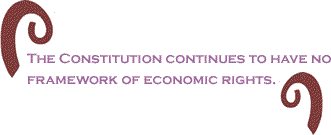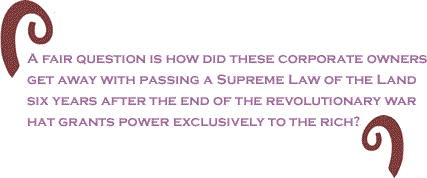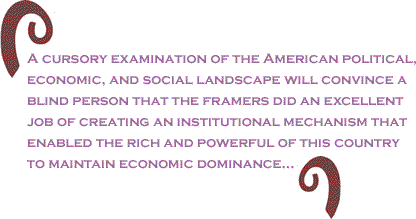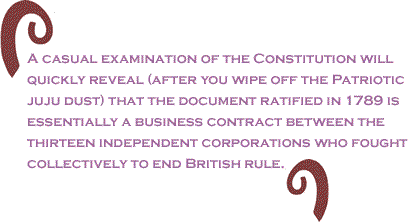Click here to read any of the commentaries in this
series.
BlackCommentator.com Editorial Board member Chuck Turner is writing this column
from the U.S. Federal Prison in Hazelton, West Virginia
where he is serving a three year term for a bribery conviction. BC is in contact with Mr. Turner by email and telephone.
Click here to send an email message that BC can pass on to Chuck
Justice
Louis D. Brandeis, former Justice of the US Supreme Court
tried to warn us almost 70 years ago of the dangers we are
facing today when he said, �We may have democracy, or we
may have wealth concentrated in the hands of the few, but
we cannot have both.� (Labor, October 14, 1941)
 The
cruel irony, from my vantage point, is that the root of
the problem was and continues to be the Supreme Law of the
Land, the Constitution, that Brandeis and his fellow justices
were appointed to interpret.��� The
cruel irony, from my vantage point, is that the root of
the problem was and continues to be the Supreme Law of the
Land, the Constitution, that Brandeis and his fellow justices
were appointed to interpret.���
A
casual examination of the Constitution will quickly reveal
(after you wipe off the Patriotic juju dust) that the document
ratified in 1789 is essentially a business contract between
the thirteen independent corporations who fought collectively
to end British rule.
The
Preamble to the Constitution is very clear if interpreted
correctly in citing why the corporation owners (the largest
land owners in each state) were willing to subjugate the
interests of their corporation to the control of the elected
representatives of all the other corporations and the central
government that they would create and maintain. The interpretation
of their true meaning is inside the parentheses.��
�We
the People (largest land owners) of the United States,
in order to form a more perfect Union (business compact);
establish Justice (Suppress dissent - Alien Sedition
Act - 1789); insure domestic tranquilly (create
an army so if those damn farmers think they can mess with
us, we�ll give them a whipping�); provide for the common
defense (we need to create a navy too to fight the British
when they begin to think about taking us on again);
�promote
the general welfare (since this contract had nothing
to do with the welfare of the people of the country -
the vast majority of whom couldn�t vote - general welfare
refers to trade deals, control of currency to suppress demand
of farmers for cheaper money, treaties; relations between
states - general welfare equals corporate welfare);
and to secure the blessings of Liberty (and control of
the land and the wealth thereof) to ourselves and our
Posterity, do ordain and establish this Constitution for
the United States of America.��

A
cursory examination of the American political, economic,
and social landscape will convince a blind person that the
framers did an excellent job of creating an institutional
mechanism that enabled the rich and powerful of this country
to maintain economic dominance to an obscene degree despite
the window dressings of evolving voting rights and civil
rights.
As
Adam Smith predicted in 1776, �Civil Government, so far
as it is instituted for the security of property, is in
reality instituted for the defense of the rich against the
poor, or of those who have some property against those who
have none.��
A
fair question is how did these corporate owners get away
with passing a Supreme Law of the Land six years after the
end of the revolutionary war that grants power exclusively
to the rich?� There were, I believe, a number of key ingredients
in their recipe for success.� First, a shroud of secrecy
hung over the proceedings that were conducted in secret.
In fact, it took fifty five years before the public was
able to see a copy of the proceedings.
A
second key factor was the fact that Shay�s rebellion had
just been suppressed by force of arms which certainly discouraged
any marching on the convention. Third, many of the wealthy
who may have sided with the people had been intimidated
by the MA rebellion and therefore felt the need for a standing
army. Fourth, class interests were another force drawing
the reluctant together with the adamant.
However,
I believe that the crucial element in the success of the
corporate owners� strategy was patience.� The convention
was described as an opportunity to consider amendments to
the Articles of Confederation that linked the 13 independent
colonies. However, Alexander Hamilton, who became the first
Secretary of the Treasury and James Madison, who became
the fourth president, were secretly conspiring to have the
group develop a new Constitution.
It
took them three years from their illegal beginning in 1786,
but by 1789 they were able to get 9 of the 13 states to
ratify the document, thus establishing a standing army and
a central government to solidify the control of the land
and wealth of this country by those with land and wealth.

There
were those like George Mason, the Virginia statesman (wrote
the Virginia Bill of Rights in 1776) who stood up for the
voiceless and refused to sign the final draft with its absence
of any rights for the people. Patrick �Give me liberty or
give me death� Henry would not give validation to the convention
and refused to attend.
Others
such as Luther Martin, John Francis Mercer, Elbridge Gerry
attended but also refused to sign the final draft. John
Lansing and Robert Yates of the New York delegation attended
but left after six week because of their opposition to the
consolidation plan being engineered by Hamilton and Madison.
Of the six, two members appointed by the state legislatures,
fifty five actually showed up at the convention. Of the
fifty five who came only 39 stayed to sign the final document.
However,
despite the resistance of some, the final draft of the constitution
was ratified without a Bill of Rights. As John Miller said
in Origins of the American Revolution (1943):� �(The Framers
of the Constitution)�had no wish to usher in democracy in
the United States. They were not making war upon the principle�
of aristocracy and they had no more intention than had he
Tories of destroying the tradition o f upper class leadership
in the colonies.
James
Madison yielding to mounting pressure introduced at the
First Congress in 1789, the Bill of Rights which took two
years before achieving ratification on December 15th, 1991.�
However, the first ten amendments to the Constitution, known
as the Bill of Rights, could be classified as� �civil rights�.
Wikipedia
defines civil rights as a class of rights that protect individuals�
freedom from unwarranted infringement by government and
private organizations, and ensures one�s ability to participate
in the civil and political life of the state without discrimination
and repression.

Civil
rights include the ensuring of people�s physical integrity
and safety, protection from discrimination on grounds such
as physical or mental disability, gender, religion, race,
national origin, age, or sexual orientation, and individual
rights such as the freedoms of thought and conscience, speech
and expression, religion, the press, and movement.
The
civil rights provided by these ten and the majority of the
additional 16 are very important in terms of providing a
framework for protection against abuse by government at
any level. However, given our experience today, we have
a legitimate right to raise the question of whether the
average person regardless of race, creed, color, or sexual
orientation can feel protected as long as the Constitution
continues to have no framework of economic rights.
It
appears that the Wisconsin 14 are on the verge of victory
and that collective bargaining will be taken off the bargaining
table. This is a tremendous victory. It should make us all
proud to see legislators standing shoulder to shoulder with
the people defending collective bargaining. Yet, despite
the successful strategizing and organizing and the tremendous
victory; we still have no constitutional framework for protecting
our economic rights.� The struggle may be won in Madison
tomorrow but the reality is that these rights continue to
be vulnerable until they are constitutionally mandated.
How
you ask do we in this 21st century, 222 years after the
Constitutional was ratified build into our Constitution
a framework of economic rights? Let me suggest a plan. However,
before talking about the details let me share a story. Forty
two years ago, the people of Massachusetts were convinced
that the government was in fact going to build a highway
through many MA communities including Boston in order to
complete MA�s portion of the national defense highway, I-95,
running from Maine to Florida.
A
group of organizers in Roxbury decided to join organizers
in other communities and fight the highway coming through
our respective communities. Many in our community said,
�Why are you doing that. You know people don�t win highway
fights. There is a national trust fund to pay for it. How
can you fight it? Our organizers� response was how do we
not fight it. To do nothing is to accept its destruction.
By the way, WE WON.
To
me that is similar to the situation that is facing us regarding
economic rights. We can continue to fight for crumbs from
the budget. We can continue to fight for jobs programs but
if we don�t put a framework of economic rights together
and build it into the Constitution, we the people will find
ourselves more and more entrapped by the growing wealth
and power of the oligharchy.�
Remember,
there have been no economic rights for people built into
the Constitution since it was passed 222 years ago, Yet,
136 years ago the Supreme Court gave corporation a legal
life meaning that they can come into court with their fancy
lawyers and financially driven bottom line strategy to challenge
our economic rights as human beings and citizens. Last year,
the Supreme Court opened the piggy bank for their wealthy
patrons and look what happened not only in Wisconsin but
across the country.

When
does our turn come? I think we take our turn at implementing
economic rights by developing a plan. Let talk steps:�
1) Conceptualize: We must call on organizers across the
country to share formulations of economic right approaches
that have been developed.� An assessment should identify
approaches that provide a reason framework to aide people�s
thinking.
2) Research: We must call on organizations to come together
state by state to research what it would take to pass an
Economic Bill of Rights into their constitution.���
3) Organize: With the information regarding the passage
of a state Bill of Economic Rights, we need to have our
supporters state by state create as many caucuses as possible
in order to bring people together in similar grouping to
begin to think about what a bill of economic rights should
look like and what concrete actions could be taken to advance
the implementation of economic rights in the particular
areas.
4) Network: Once the caucuses have begun to make progress
in developing their thinking regarding a framework of economic
rights and concrete actions that could be taken, they should
be encouraged to network with other organizations to come
up with a unified plan.
5) Implement: Networks should be encouraged to put their
concrete plans into action in order to build public consciousness
and awareness.
6) Nationalize: Bring together reps from states to share
progress and develop national strategies.
7)
Assess: Having
been through the steps 1 to 6, groups in all the states
should evaluate progress, reformulate plan, and implement.
Click here to read any of the commentaries in this
series.

BlackCommentator.com Editorial Board Member Chuck
Turner - Served as a member of the Boston City Council
for ten years and eleven months. He was a member and founder
of the Fund the Dream campaign and was the Chair of the
Council�s Human Rights Committee, and Vice Chair of the
Hunger and Homelessness Committee. Click here to
contact Mr. Turner. Your email messages will be passed on
to Mr. Turner by BC. You may also visit SupportChuckTurner.com.
You
may also write to Mr. Turner. The address is:
Charles Turner #80641038
Hazelwood Penitentiary, P.O. Box 2000
Bruceton Mills, West Virginia 26525
|

